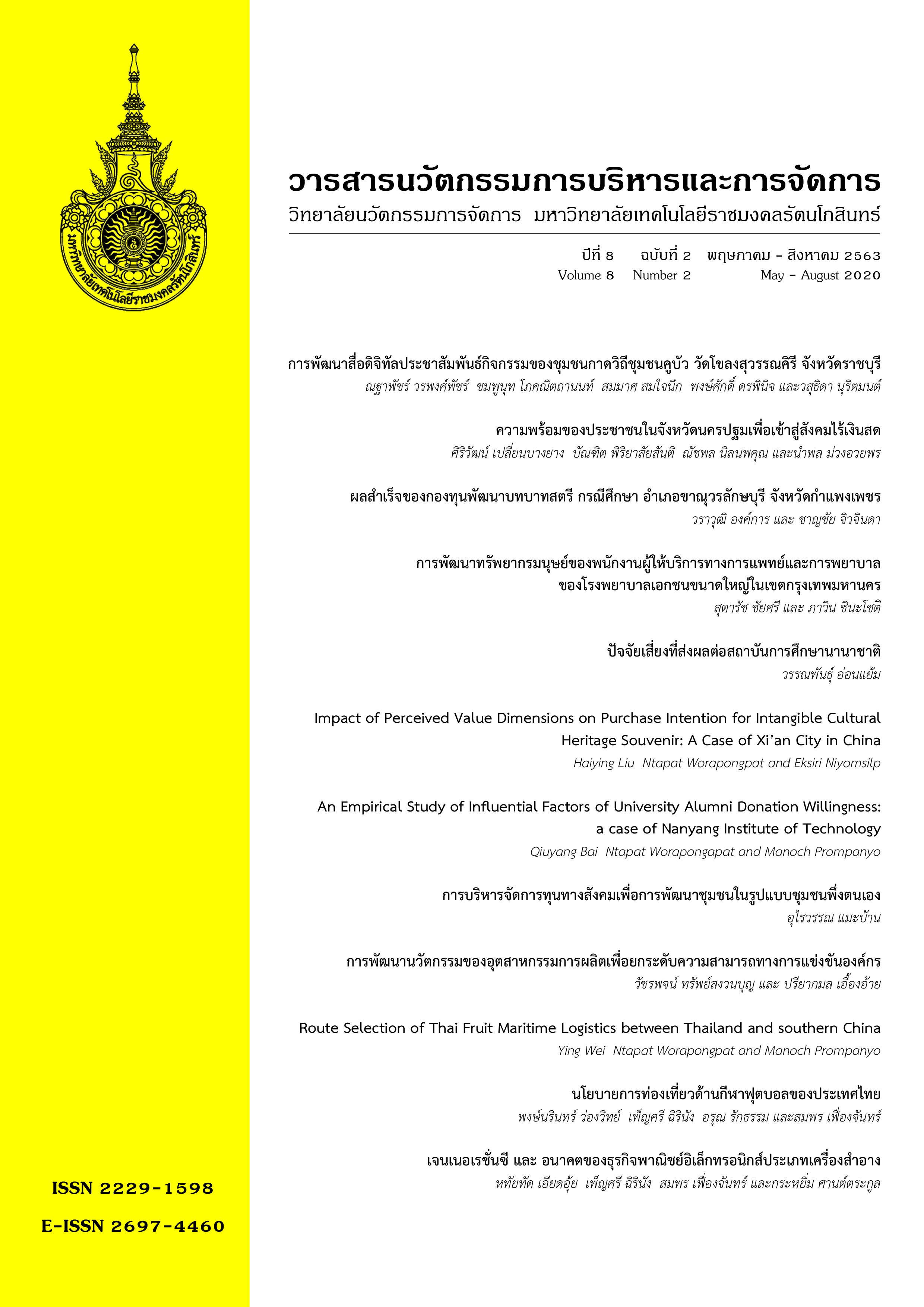การบริหารจัดการทุนทางสังคมเพื่อการพัฒนาชุมชนในรูปแบบชุมชนพึ่งตนเอง
Main Article Content
บทคัดย่อ
บทคัดย่อ
การวิจัยครั้งนี้มีวัตถุประสงค์เพื่อ 1) ศึกษาบริบทที่มีผลต่อการบริหารจัดการทุนทางสังคมและ 2) เพื่อศึกษากลยุทธ์การบริหารจัดการทุนทางสังคมที่มีผลต่อการพัฒนาชุมชนในรูปแบบชุมชนพึ่งตนเองการวิจัยครั้งนี้เป็นการวิจัยเชิงคุณภาพ กรณีศึกษาตำบลโหล่งขอด อำเภอพร้าว จังหวัดเชียงใหม่ และตำบลน้ำเกี๋ยน อำเภอภูเพียง จังหวัดน่าน เก็บข้อมูลการวิจัยแบบมีส่วนร่วมหลายรูปแบบ คือวิเคราะห์และการสังเคราะห์เอกสาร การสัมภาษณ์เจาะลึก การสนทนากลุ่มและการสังเกตแบบมีส่วนร่วม
ผลการวิจัย พบว่า 1)บริบทที่มีผลต่อการบริหารจัดการทุนทางสังคม พบว่า สภาพทุนทางสังคมของชุมชน ได้แก่ ทุนมนุษย์ ทุนสถาบัน ทุนวัฒนธรรมและภูมิปัญญาทรัพยากรธรรมชาติและสิ่งแวดล้อม พบว่า ด้านทุนมนุษย์ หากมีผู้นำชุมชนทั้งที่เป็นทางการและไม่เป็นทางการ เข้ามามีบทบาทในการขับเคลื่อนชุมชนอย่างจริงจัง จะทำให้ชุมชนนั้นเข้มแข็งและพึ่งตนเองได้ ซึ่งทุนมนุษย์เป็นหัวใจสำคัญในการขับเคลื่อนให้การพัฒนาบรรลุตามเป้าประสงค์ที่วางไว้ โดยมีทุนทางสถาบันต่างๆ ในพื้นที่ เข้ามาเป็นภาคีเครือข่าย สร้างการมีส่วนร่วม การแลกเปลี่ยนเรียนรู้โดยอาศัยทุนทางวัฒนธรรมภูมิปัญญา เป็นองค์ประกอบของสิ่งแวดล้อมที่มีอยู่ในชุมชน ซึ่งได้แก่ขนบธรรมเนียมประเพณี ความเชื่อและสิ่งต่างๆ ที่เป็นอัตลักษณ์ของชุมชน ซึ่งในการขับเคลื่อนการดำเนินกิจกรรมต่างๆ ให้ชุมชนเข้มแข็งต้องอาศัยชุมชนเป็นหลักในการพัฒนามากกว่าอาศัยภาครัฐที่จะเข้ามาช่วยเหลือ การใช้กลยุทธ์การบริหารจัดการทุนทางสังคมที่มีผลต่อการพัฒนาชุมชนในรูปแบบชุมชนพึ่งตนเอง พบว่า มีการขับเคลื่อนชุมชนโดยมีการวางแผน และการประสานงานภายในชุมชนอย่างเป็นรูปธรรม ประชาชนเข้ามามีบทบาทในการร่วมศึกษาปัญหา ร่วมคิด ร่วมทำ ร่วมตัดสินใจ และวางแผนในการดำเนินงานและประสานงานร่วมกัน กลยุทธ์การบริหารจัดการที่ชุมชนนำมาใช้ในการพัฒนาชุมชนพึ่งตนเอง คือ การจัดการความรู้ ซึ่งการจัดการความรู้ ได้แก่ การสร้างความรู้ การจัดเก็บความรู้ การแบ่งปันความรู้ และการประยุกต์ใช้ความรู้ การบริหารทุนทางสังคมจึงเป็นปัจจัยความสำเร็จหลักของการพัฒนาชุมชนพึ่งตนเองในชุมชนท้องถิ่นไทย
Article Details
ข้อความและบทความในวารสารนวัตกรรมการบริหารและการจัดการ เป็นแนวคิดของผู้เขียน ไม่ใช่ความคิดเห็นและความรับผิดชอบของคณะผู้จัดทำ บรรณาธิการ กองบรรณาธิการ วิทยาลัยนวัตกรรมการจัดการ และมหาวิทยาลัยเทคโนโลยีราชมงคลรัตนโกสินทร์
ข้อความ ข้อมูล เนื้อหา รูปภาพ ฯลฯ ที่ได้รับการีพิมพ์ในวารสารนวัตกรรมการบริหารและการจัดการ ถือเป็นลิขสิทธิ์ของวารสารนวัตกรรมการบริหารและการจัดการ หากบุคคลใดหรือหน่วยงานใดต้องการนำทั้งหมดหรือส่วนหนึ่งส่วนใดไปเผยแพร่ต่อหรือกระทำการใดๆ จะต้องได้รับอนุญาติเป็นลายลักษณ์อักษรจากวารสารนวัตกรรมการบริหารและการจัดการก่อนเท่านั้น


